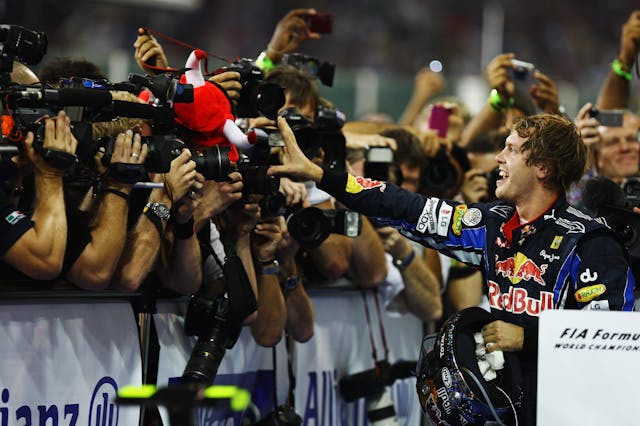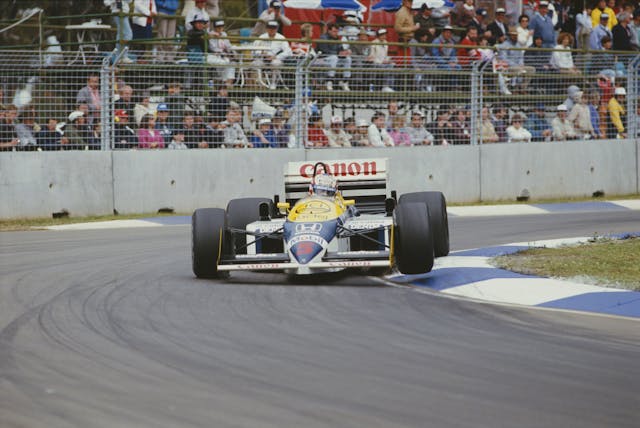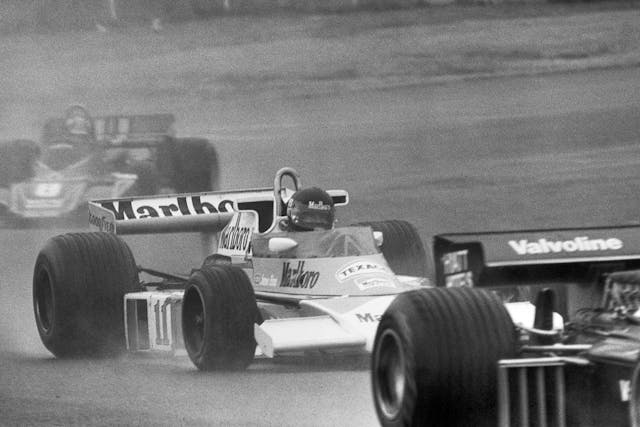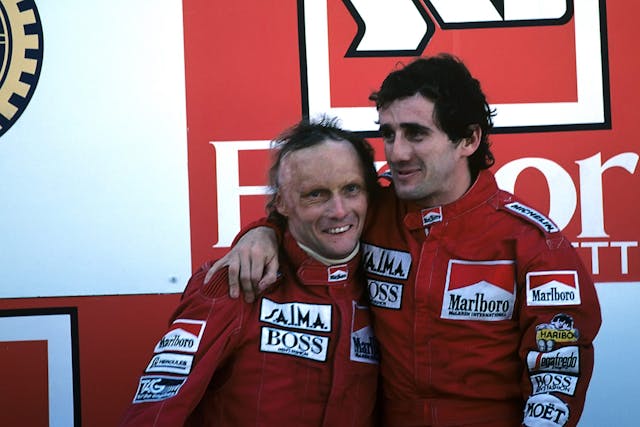10 times the F1 championship went to the wire
After a long and grueling season, with 22 races on the 2021 calendar, Max Verstappen and Lewis Hamilton go into the final two grands prix of the season, both with a chance of grasping the Formula 1 title. Given the Mercedes walkover of the past few years, two drivers in different cars with a performance pendulum swinging like a grandfather clock’s is a welcome novelty for any motorsports fan.
This weekend sees the penultimate round of the 2021 F1 championship, held in Jeddah, Saudi Arabia. The weekend following it’s on to Abu Dhabi and the final showdown at Yas Marina. Verstappen begins the final two back-to-back events with an eight-point lead but Hamilton and his Mercedes appear fit and fast. Time will tell which driver and team did everything possible to take the title.
To celebrate the championship going to the wire, we thought we’d rank our top 10 grand prix title tussles. To be included, the championship had to be decided at the last race of the season. Buckle up and see if you agree with us.
10. 1988 – Senna vs. Prost: Seconds out, round 1

Having the best car by far is every driver’s dream. Having a teammate who’s as good as you, if not better, turns it into a nightmare. The battles between McLaren-Honda teammates Ayrton Senna and Alain Prost became the stuff of legend. And they didn’t always hate one another. In 1988 they raced hard and, almost, fairly.
The lithe, low McLaren-Hondas dominated on track, winning 15 of the year’s 16 races. Prost triumphed in seven races, finished second seven times, and scored 11 points more than his Brazilian nemesis. But when the dust settled after the season-ending Australian Grand Prix, Senna lifted the title. How so?
Only the 11 best results counted to that year’s championship. Under that criteria, Senna with eight wins (including an early summer purple patch where he won six from seven) was champion.
9. 2007 – Iceman keeps his cool

Two top drivers in identical cars taking points off each other and allowing a third driver in through the back door is a familiar scenario in Formula 1. And that’s exactly how it panned out in 2007.
McLaren-Mercedes duo Fernando Alonso and Lewis Hamilton fought an increasingly bitter battle through 2007, as the reigning world champion struggled and increasingly failed to keep his rookie teammate at bay.
Going into the final race in Brazil, Hamilton had 107 points to Alonso’s 103. Ferrari’s famously cool Kimi Räikkönen was the outside bet with 100 points.
Hamilton struggled with gearbox problems, eventually finishing seventh and Alonso came third. Neither could do anything about the Ferraris of Felipe Massa and Räikkönen. When Massa handed Räikkönen the win, it sealed the title in the Finn’s favor. He came out one point up on the two warring McLaren men.
8. 1981 – Spinning the roulette wheel

In 1981, the three title tusslers gambling in the casino—well, around a converted car park in Las Vegas—were Nelson Piquet, Carlos Reutemann, and Jacques Laffite. Three men, three different cars.
Loosely, Frenchman Laffite had to win the grand prix to be champion with neither of the other two scoring; Brazilian Brabham driver Piquet simply had to beat long-time championship leader Reutemann. When the Argentine qualified his Williams on pole position he seemed to have one hand on the title.
None of the three wannabe champs had a stellar race. Reutemann dropped back, afterwards complaining of gearbox trouble although Williams never found any evidence of it. Piquet vomited in his helmet because of the extreme heat. And Laffite tooled around to an uninspired sixth place.
Piquet crucially finished fifth and with Reutemann only coming eighth—null points in those days—the Brazilian Brabham driver was the champion.
7. 1958 – F1’s cruel early days

The early days of Formula 1 were inhumane. In 1958, four grand prix drivers were killed on the track. Bearing that in mind it seems almost inconsequential that Mike Hawthorn managed to claim the championship—with the death of one of the four deciding the Moroccan Grand Prix and the title.
Going into that final race in north Africa, Ferrari driver Hawthorn was leading the championship courtesy of a win and four second places. Vanwall driver Stirling Moss, meanwhile, had three wins. The British team attempted to use their other cars of Tony Brooks and Stuart Lewis-Evans to keep Hawthorn out of the second place he needed.
Both Vanwalls’ engines blew. Lewis-Evans died from the burns he suffered after his motor seized. Moss scored his fourth win of the year but Hawthorn lifted the title by a single point when he finished second. Again.
Moss’s win did see British constructor Vanwall beat Ferrari to the inaugural constructors’ championship. Hawthorn, sadly, didn’t enjoy his title for long. He died in a road crash in early 1959.
6. 2010 – Last-race four-way fight

Hardly ever do we see four drivers from three teams going into the last round with a chance at the championship. But that’s what happened in 2010. Sebastian Vettel, Mark Webber, Fernando Alonso, and Lewis Hamilton could all come away from the season’s last race in Abu Dhabi as champ.
Vettel qualified his Red Bull fastest and rocketed off into a lead he’d never lose. Ferrari made a rare mess of its race strategy, pitting title favorite Alonso at almost the worst possible time.
The Spaniard who only needed to finish fourth to win the title then got stuck behind Russian rookie Vitaly Petrov, with Webber right behind. Unable to pass, Alonso watched his championship chances dribble away as the laps ticked off.
Hamilton, the long shot, finished second but that wasn’t enough to overturn winner Vettel’s points total. The German became only the third man to win the championship having not led it at all during the season. 1964 and ’76 were the other two.
5. 2016 – The last champ not called Lewis

After being beaten by Mercedes-Benz teammate Lewis Hamilton in 2014 and 2015, Nico Rosberg came out all guns blazing in 2016.
The lead of the championship swung between the Merc drivers—who had been childhood besties—throughout the season. The battle between them spilled out of the cars into bitter acrimony in the garage.
For the final race in Abu Dhabi, Rosberg had a 12-point lead. There followed an extraordinary situation where Hamilton took the lead then slowed down to back the field into his second-placed teammate. His hope was that another driver would overtake Rosberg (or take him out) giving Hamilton the points gap he needed to lift the title.
It didn’t happen. Rosberg became the last man whose name wasn’t Lewis to win an F1 championship. Doing so had taken so much out of him that he retired five days later.
4. 1984 – Half a point makes all the difference

The hare and the tortoise, the pupil and the wise old master. Combine those two metaphors and you’ve got Alain Prost and Niki Lauda in 1984. The Frenchman won seven of the season’s 16 races yet lost the title to Lauda by a mere half a point at the final round.
Prost won that race in Portugal but Lauda, in second spot, lifted the title. The Austrian had already taken two titles and appreciated the value of consistency. When Prost won, Lauda scored points. When Prost broke down, Lauda either won or scored points.
Despite winning four of the season’s final six races, Prost ran out of time to overhaul the wily Lauda’s lead.
3. 1986 – “Mansell’s fighting for control”

Who remembers getting up in the early hours to watch the crowning of the first British world champion for a decade? That was the dream …
The year was 1986, the grand prix was in Australia, the champion in waiting a mustachioed Brummie called Nigel Mansell. And of course it all ended in tears—ours and Our Nige’s.
If you were watching bleary-eyed, you might recall sitting up as the flames from Murray Walker’s famous incendiary trousers flared up and he screamed: “And look at that, that is Nigel Mansell. And the car is absolutely shattered. He’s fighting for control…”
During the season it had been a titanic duel between Mansell and Nelson Piquet in the super-fast Williams-Hondas and the more circumspect McLaren-TAG of Alain Prost. Mansell and Piquet spent the season taking points off each other, Prost somehow remained in contention throughout.
In the final race, Mansell was the favorite but both Williams drivers suffered tire trouble, the Briton dramatically so. Prost capitalized and became the first driver to win consecutive titles for a quarter of a century.
2. 1964 – Brits battle to the last lap

The most memorable title tussles are when drivers from different teams are involved. In 1964, there were three drivers (all Brits) from three teams (Ferrari, BRM, and Lotus) who went into the final race with a tilt at the title.
First to fall was Graham Hill, delayed after an elbows-out overtaking move from Ferrari’s Lorenzo Bandini seriously damaged his BRM’s exhausts. To lift the crown, all Jim Clark had to do was win for Lotus with the Ferrari of John Surtees’ Ferrari lower than second.
A couple of laps from the end Clark noticed oil on the track. Shortly before the last lap, he was horrified to realize the oil was his. With no lubricant left in it Clark’s Climax V8 seized, almost within sight of the checkered flag.
That gave Surtees the chance to take the title. But he had to beat his teammate. Ferrari clocked this and gave Bandini the message. In his second good team deed of the day, the young Italian let Surtees past giving the former bike champ the two points needed to shade Hill in the title race.
1. 1976 – A season worthy of a film

Hunt v. Lauda. If you hadn’t heard about it, the film Rush will have given you the gist. Blond, maverick Brit versus calculating Austrian champion. Ferrari star Niki Lauda built up a massive lead in the championship after winning four of the first six races before McLaren’s James Hunt hit his stride.
Then came the German Grand Prix at the fearsome Nürburgring Nordschleife. That day’s horrendous wet weather aside, Lauda was already campaigning against the track, saying at 14 miles long it was too dangerous. His fiery crash in that German race proved his point in the most atrocious fashion.
Hunt then went on a winning streak. Horrifically scarred, Lauda returned to racing six weeks after a priest had given him the last rites. The battle went to the wire in the Japanese Grand Prix with the Austrian somehow still leading the championship by three points.
Lauda pulled off the streaming wet track after two laps, not wishing to tempt fate further. Hunt led, then had a puncture. He clawed his way back up through the field to third, taking the four points he needed to win the title. The most dramatic championship ever, in our view.
Let’s hear yours!


